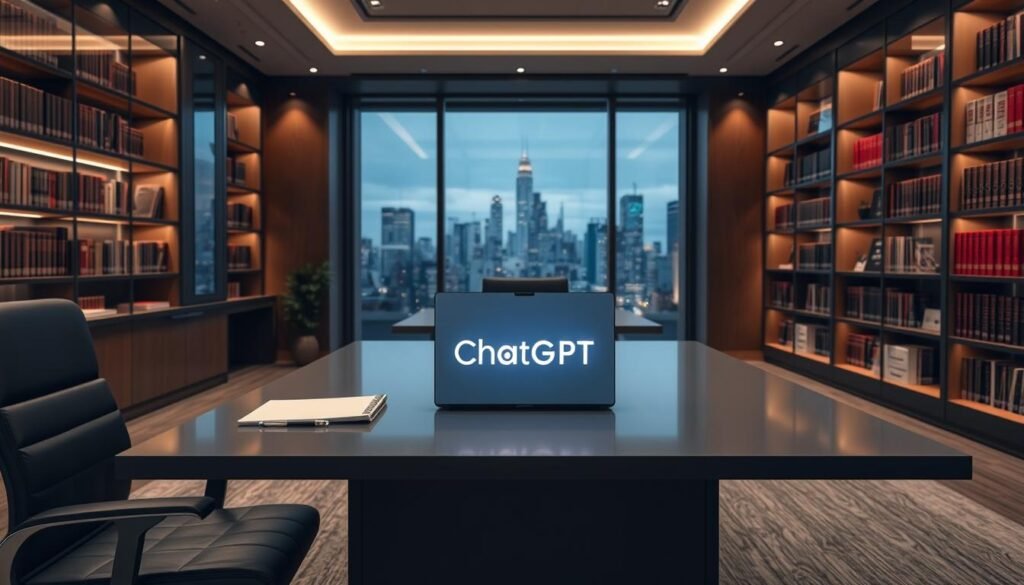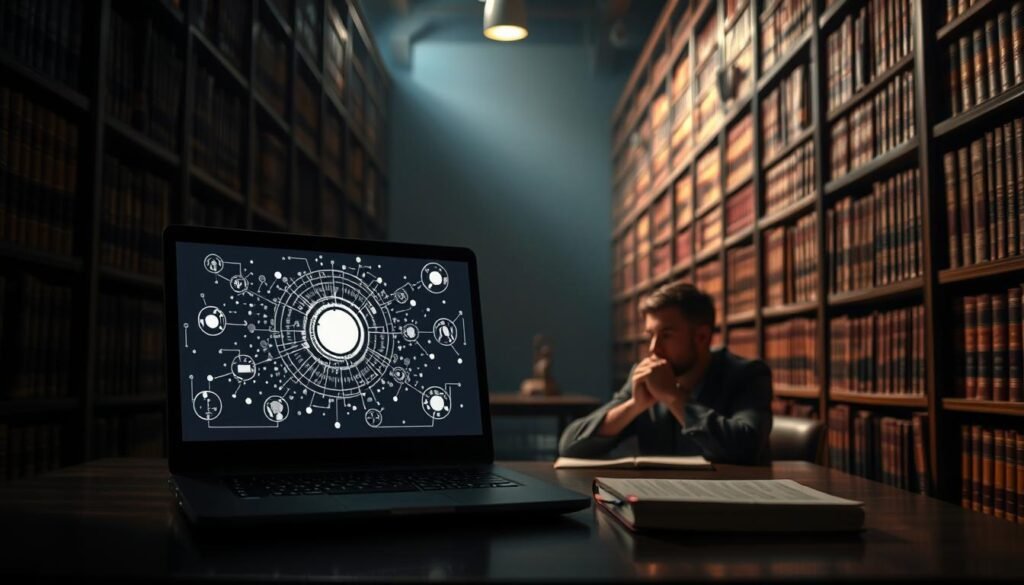Did you know that over 80% of attorneys now rely on technology to enhance their legal research? This surge in technological adoption underscores the critical need for efficient access to vast information, especially for legal professionals. As artificial intelligence progresses, mastering the use of ChatGPT for legal research has become crucial. It enables professionals to streamline their processes and enhance their outcomes. This article delves into the benefits of using ChatGPT for legal research, showcasing how it can revolutionize legal tasks. It makes research not only quicker but also more precise and accessible.
Key Takeaways
- Over 80% of attorneys utilize technology to enhance legal research.
- ChatGPT offers significant efficiency improvements in legal research.
- AI tools like ChatGPT provide access to a wealth of legal information.
- Learning to use ChatGPT can transform traditional legal workflows.
- ChatGPT is a user-friendly tool suitable for all legal professionals.
Understanding the Basics of ChatGPT for Legal Research
ChatGPT represents a revolutionary tool in the technological sphere, particularly within the legal field. OpenAI developed it, employing sophisticated machine learning algorithms to grasp human language. This makes it an invaluable asset for legal research, allowing professionals to refine their research skills and optimize their workflows.
What is ChatGPT?
ChatGPT is an AI model designed to generate text responses that mimic human language. It is trained to interpret user queries and deliver relevant information across diverse fields, including law. By employing ChatGPT legal research techniques, legal experts can uncover critical insights, case law, and statutes efficiently. This tool ensures that legal arguments are robust and well-informed.
How Does ChatGPT Work?
ChatGPT’s functionality hinges on its capacity to analyze vast datasets, providing contextually fitting responses. It sifts through extensive legal texts and resources, facilitating the extraction of crucial information swiftly. This capability enables legal professionals to adopt efficient research methods, reflecting a cutting-edge approach that meets contemporary needs. For a deeper dive into its application in legal settings, refer to this resource.
Advantages of Using ChatGPT in Legal Research
The integration of ChatGPT in legal research brings forth numerous benefits, significantly enhancing efficiency and access to vast information. This cutting-edge technology offers substantial ChatGPT benefits for legal research, particularly in terms of efficiency and access to extensive information.
Efficiency and Speed
One of the primary advantages of using ChatGPT in legal research is its remarkable efficiency. Traditional legal research methods are often time-consuming, requiring hours or even days to gather relevant information. ChatGPT, however, streamlines this process, providing instant results through its automated search capabilities. Lawyers can quickly access relevant case law, statutes, and legal precedents. This allows them to focus more on ChatGPT legal data analysis and developing effective case strategies.
Access to a Wealth of Information
Another significant benefit is the vast wealth of information available through ChatGPT. Legal professionals can access a comprehensive database of legal materials. This extensive resource pool not only enhances research capabilities but also improves the quality of legal analysis. The implications of using AI in legal research can be explored further in this informative article. The ability to quickly access comprehensive legal information ensures that practitioners remain well-informed and equipped to make better decisions.
Setting Up ChatGPT for Your Legal Needs
Integrating ChatGPT into your legal research workflow involves a few straightforward steps. First, you must establish an account on the OpenAI platform. Next, choose the subscription plan that best suits your needs. These foundational steps are crucial for leveraging ChatGPT to its fullest potential in legal research.
Creating an Account
To start using ChatGPT for legal research, creating an account is the first step. Visit the OpenAI website and locate the registration page. Provide your name, email address, and a robust password. This secure registration process safeguards your personal data while granting you seamless access to ChatGPT.
Choosing the Right Subscription Plan
OpenAI presents a range of subscription plans to meet diverse needs. Assess your usage frequency and the intricacy of your legal research tasks. Examine the available options and opt for a plan that aligns with your financial constraints and needs. This careful selection maximizes the utility of ChatGPT in legal research.
Crafting Effective Queries for Legal Research
When utilizing ChatGPT for legal research, crafting precise queries is paramount. Structured questions enhance the accuracy and relevance of responses. By employing effective techniques, you optimize your experience and receive superior ChatGPT legal query assistance. Consider these essential techniques.
Key Techniques for Asking Questions
- Be Specific: Clearly articulate the legal issue or question. Ambiguity can result in confusion and irrelevant answers.
- Use Keywords: Include crucial legal terms and concepts in your query. This refines the scope of the ChatGPT search for legal information.
- Provide Context: Offering background information or case specifics aids in delivering more tailored responses from ChatGPT.
- Ask for Examples: Requesting examples can elucidate complex legal principles or terms.
Examples of Legal Queries
Below are practical examples of queries for various legal scenarios:
- What are the key elements needed to establish a breach of contract?
- Can you explain the differences between civil and criminal law?
- What defenses are available for a defamation claim?
- How does the statute of limitations affect personal injury cases?
Evaluating the Responses from ChatGPT
Utilizing ChatGPT for legal data analysis necessitates a critical evaluation. The AI tool’s output may diverge from established legal norms. It is imperative for legal professionals to actively verify the accuracy of the information. They must also acknowledge the inherent limitations of AI-generated content.
Checking for Accuracy
Confirming ChatGPT’s responses through cross-reference with trusted legal sources is crucial. This step ensures the data’s congruence with current legal frameworks. Employing rigorous verification techniques enhances the reliability of the data obtained from ChatGPT during legal research.
Understanding the Limitations
ChatGPT’s inability to offer personalized legal advice is a critical limitation. It may generate responses based on outdated or incomplete data, potentially leading to inaccuracies. Legal professionals must use ChatGPT with caution, recognizing its role in legal data analysis but not as a replacement for professional legal expertise. This understanding promotes a more precise and effective integration of AI in legal workflows, particularly in scenarios requiring exact legal documentation, as discussed in legal document review.
Integrating ChatGPT into Your Legal Workflow

Legal professionals can significantly improve their research by integrating ChatGPT into their workflows. This integration enables lawyers to harness AI’s efficiency while maintaining the depth of traditional research. By adopting ChatGPT, teams can streamline their research and enhance collaboration.
How to Use ChatGPT Alongside Traditional Research
Combining ChatGPT with traditional research methods can significantly enhance workflow efficiency. Here are some strategies to achieve this:
- Use ChatGPT for initial research to gather broad insights on legal topics.
- Verify the information obtained from ChatGPT with standard legal databases and libraries.
- Utilize ChatGPT to generate drafts or outlines, which can then be refined using traditional resources.
- Incorporate specific case laws or statutes into queries to obtain targeted responses.
Collaborating with Colleagues
Team-based strategies can greatly benefit from ChatGPT’s insights. Legal professionals can:
- Share findings from ChatGPT to foster discussion and collaborative analysis.
- Encourage colleagues to ask diverse questions, enriching the range of insights available.
- Compile responses and evaluate them collectively for enhanced accuracy and thoroughness.
- Organize regular sessions to discuss the applications of ChatGPT for various legal challenges.
By leveraging ChatGPT in both traditional and collaborative contexts, law firms can improve their effectiveness. They can deliver timely, informed legal solutions.
Case Studies: Successful Use of ChatGPT in Law Firms
Real-world examples showcase the profound impact of ChatGPT on legal research. Law firms have leveraged this AI technology to boost their research efficiency and streamline operations. These case studies highlight not just enhanced accuracy but also substantial time savings. They demonstrate how AI integration can fundamentally transform legal practices.
Law Firm A’s Experience
Law Firm A adopted ChatGPT to aid their paralegals in legal research. The AI’s extensive data processing capabilities significantly reduced research time. Cases that once consumed hours now took mere minutes to analyze. This efficiency allowed attorneys to devote more time to client interactions and strategic planning.
Law Firm B’s Results
Law Firm B employed ChatGPT to summarize lengthy legal documents. The AI’s capacity to condense complex information was invaluable. This greatly accelerated their document review process, leading to enhanced accuracy in legal understanding. The firm observed that ChatGPT’s benefits extended beyond time savings, improving the quality of their legal work and client service. For further insights on technology’s role in legal practice, explore this resource: the role of technology in modern legal practice and.
Ethical Considerations When Using AI for Legal Research

The integration of AI tools, such as ChatGPT, into legal research raises several ethical concerns. It is imperative for legal professionals to grasp these issues to ensure ethical use of technology. Confidentiality and adherence to legal standards are paramount.
Issues of Confidentiality
Legal practitioners must safeguard client information at all costs. AI tools can inadvertently reveal sensitive data. To address these risks, several measures are necessary:
- Utilize anonymized data for research purposes.
- Refrain from sharing identifiable client information in AI prompts.
- Implement robust security measures for AI-generated data.
By adhering to these guidelines, legal professionals can effectively manage confidentiality concerns. This ensures client data remains secure.
Ensuring Compliance with Legal Standards
Legal professionals must ensure their AI usage complies with relevant laws and standards. This entails:
- Staying abreast of regulations governing AI in legal contexts.
- Developing policies for responsible AI integration within law firms.
- Continuously reviewing practices to align with evolving legal standards.
Addressing these ethical concerns is crucial. It not only protects client interests but also upholds the integrity of the legal profession.
Advanced Features of ChatGPT for Legal Professionals
Legal professionals can greatly benefit from the advanced ChatGPT features tailored for their needs. This AI tool offers specialized assistance, enhancing research and documentation processes. It allows legal experts to streamline their workflow, ensuring they remain efficient and effective in their practice.
Personalized Research Assistance
ChatGPT provides personalized research assistance, adapting to individual legal contexts. This feature is particularly useful for:
- Tailoring case analyses based on specific legal scenarios.
- Highlighting relevant precedents and statutes applicable to unique cases.
- Offering recommendations that align with the user’s legal specialty.
Such advanced ChatGPT features enable legal professionals to focus more on strategic thinking. The AI handles routine research tasks with precision.
Using ChatGPT for Document Drafting
The application of ChatGPT for legal documentation is highly beneficial. By utilizing its drafting capabilities, legal practitioners can:
- Streamline the creation of contracts, briefs, and motions, reducing repetitive work.
- Ensure compliance with standard legal formats, enhancing clarity and professionalism.
- Utilize templates and prompts that align with specific legal requirements.
As a result, ChatGPT not only saves time but also improves the overall quality of legal writing. This efficiency allows legal teams to dedicate more time to engaging with clients and developing case strategies.
Future Trends: AI and Legal Research
The legal profession is undergoing a rapid transformation, with artificial intelligence at its forefront. Technologies like ChatGPT are becoming crucial for legal professionals. These advancements in machine learning and natural language processing promise to improve data analysis and predictive insights. This will enable attorneys to work more efficiently and effectively.
The Evolving Role of AI in the Legal Field
In the years ahead, AI will play a more significant role in assisting lawyers with routine and complex tasks. AI tools will automate time-consuming processes, allowing legal experts to concentrate on strategic decision-making. The integration of predictive analytics will revolutionize legal services, enabling lawyers to assess case outcomes and inform litigation strategies.
What’s Next for ChatGPT in Law?
ChatGPT’s evolution will likely see its applications in the legal sector expand. Future developments may include seamless integration with other legal technologies and platforms. This will create a more cohesive workflow. As legal professionals explore AI’s full potential, they will discover new opportunities for collaboration and efficiency. This will solidify AI’s role in legal research as a vital component of modern law practice.
FAQ
How can I effectively use ChatGPT for legal research?
To leverage ChatGPT for legal research, it’s crucial to pose precise and detailed inquiries. This AI tool excels in retrieving pertinent legal data, dissecting case law, and statutes. It also offers insightful analysis on legal precedents, all with remarkable speed and efficiency.
What are the benefits of using ChatGPT in legal research?
Utilizing ChatGPT in legal research offers several advantages. It significantly boosts the speed and efficiency of information gathering. It also grants access to a vast repository of legal knowledge. These benefits collectively streamline the research process, enabling legal professionals to concentrate more on strategic case planning.
Can ChatGPT assist with formulating legal queries?
Indeed, ChatGPT is adept at helping formulate effective legal queries. By ensuring your questions are specific and clear, you can optimize the AI’s responses. This results in receiving precise information directly relevant to your legal concerns.
How should I evaluate the responses I receive from ChatGPT?
Evaluating ChatGPT’s responses necessitates verifying their accuracy against reliable legal sources. It’s important to be cognizant of its limitations, such as the inability to provide personalized legal advice and the risk of outdated information. This diligence ensures the reliability of the information obtained.
What steps are involved in setting up ChatGPT for legal research?
To initiate using ChatGPT for legal research, first, create an account on the OpenAI platform. Next, select a suitable subscription plan that aligns with your research needs. Ensure the registration process is both secure and efficient to maximize its utility.
Is it possible to integrate ChatGPT with traditional legal research methods?
Yes, integrating ChatGPT with traditional legal research methods is entirely feasible. Legal professionals can harness the efficiency of AI while leveraging the depth of conventional resources. This combination can significantly enhance research outcomes.
What are some ethical considerations when using ChatGPT for legal research?
When employing ChatGPT for legal research, several ethical considerations arise. These include protecting client confidentiality and adhering to legal standards. Legal professionals must exercise caution in incorporating AI technologies, like ChatGPT, into their research practices.
How can ChatGPT help with legal document drafting?
ChatGPT can significantly streamline the document drafting process. It generates drafts tailored to specific legal contexts, automating repetitive tasks. This enhances the efficiency of legal writing, making it a valuable tool for document drafting.
What advanced features does ChatGPT offer for legal professionals?
ChatGPT provides advanced features that cater to legal professionals’ needs. It offers personalized research assistance tailored to specific legal issues. Additionally, it supports drafting legal documents, positioning it as a versatile tool within the legal field.
What future trends should we expect with AI in legal research?
Looking ahead, AI in legal research is expected to evolve significantly. Future advancements will likely include enhanced AI capabilities for data analysis and predictive insights. These improvements will likely broaden AI’s application within the legal system, potentially revolutionizing legal research practices.

